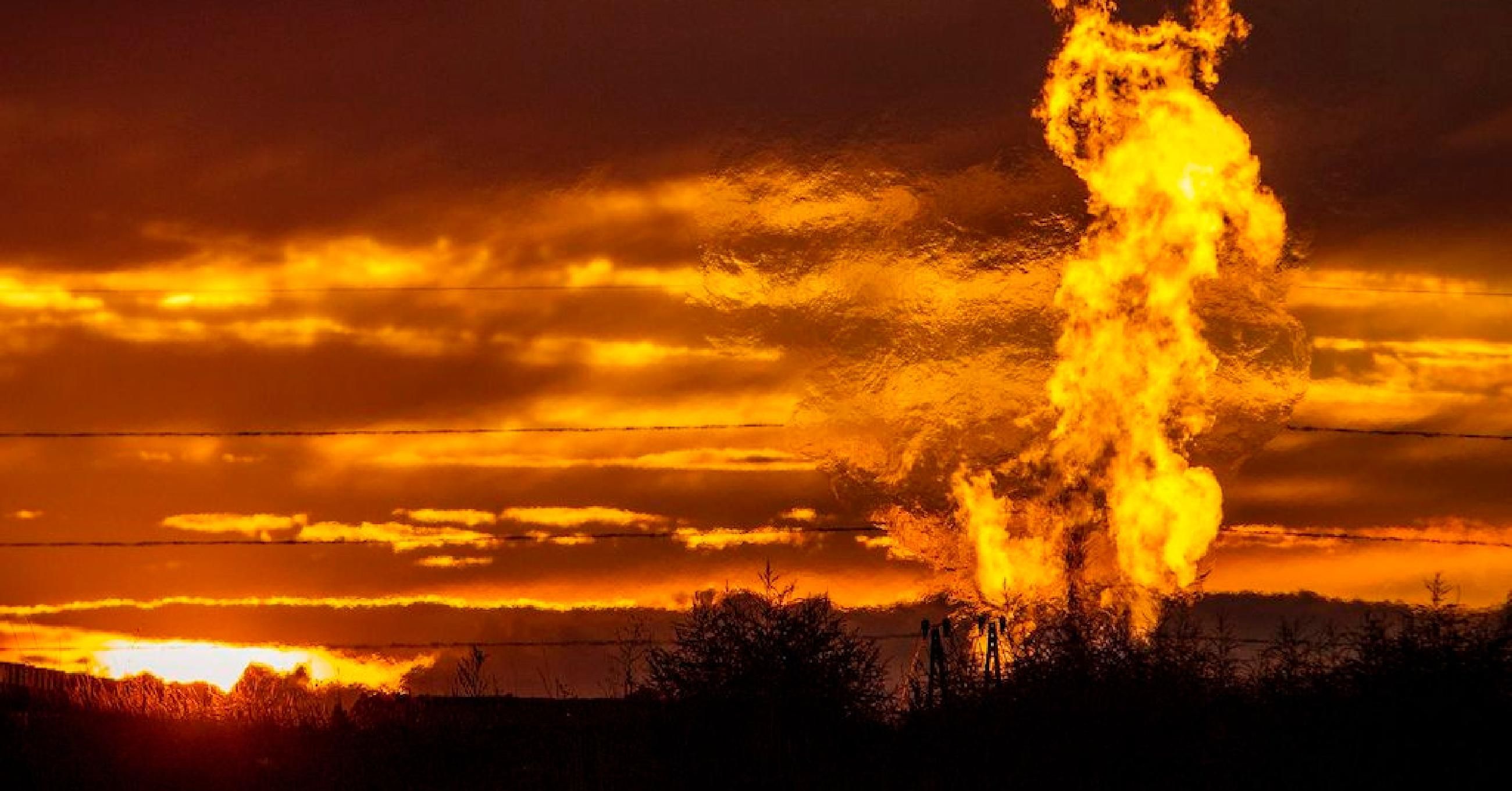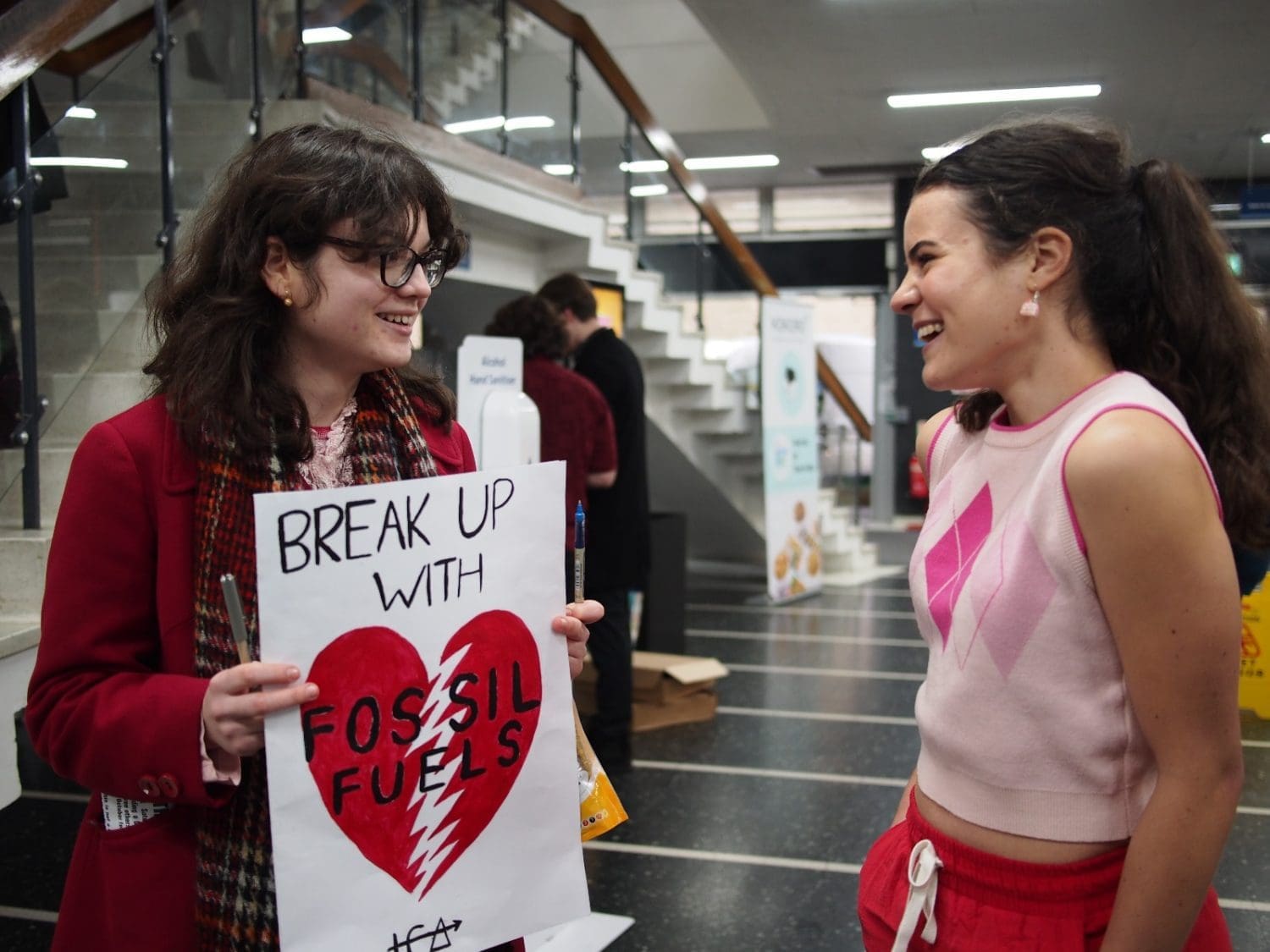The United States, the United Kingdom, Australia, Canada, and Norway "are condemning communities in the Global South to a state of perpetual crisis which they did nothing to create."

Ocean Rebellion staged a theatrical action with a Boris Johnson head and an "Oil head" burning a boat on Marazion beach on June 5, 2021 in Cornwall, United Kingdom.
KENNY STANCIL
As the COP26 climate summit draws to a close following two weeks of talks and pledges in Glasgow, a new report out Friday details five wealthy nations' life-threatening plans to expand fossil fuel production, exposing the utter emptiness of their professed commitments to decarbonization.
"Coal, oil, and gas production must fall globally by 69%, 31%, and 28% respectively between now and 2030... Projections suggest that the Fossil Fuelled 5 will... actually increase oil and gas production by 33% and 27%."
Shedding further light on the enormous gap between rhetoric and reality, the report, titled The Fossil Fuelled 5, compares governments' most recent emission reduction targets with their future energy plans and finds that even as they refer to themselves as climate leaders, the United States, the United Kingdom, Australia, Canada, and Norway intend to approve and subsidize new fossil fuel projects that "will be in operation for decades to come."
Despite climate scientists' repeated warnings about the need to keep coal, oil, and gas underground to have a fighting chance of limiting global warming to 1.5ºC above preindustrial levels by the end of the century, several of the world's wealthiest nations "are doubling down on fossil fuel production," says the report, which was assembled by Freddie Daley, a research associate at the University of Sussex, in collaboration with the Fossil Fuel Non-Proliferation Treaty Initiative, as well as key partners in each of the five countries analyzed—Oil Change International, Uplift U.K., The Australia Institute, Stand.earth, and Greenpeace Norway.
The world is currently on pace for catastrophic levels of heating, and further increasing the extraction and burning of fossil fuels—the main driver of the climate emergency—will "have disastrous impacts for all life on our planet," the report notes, "but especially those communities in the Global South who have done the least to create this crisis and have the fewest resources to adapt to its impacts."
According to the report, "Coal, oil, and gas production must fall globally by 69%, 31%, and 28% respectively between now and 2030 to keep the 1.5ºC target alive." Exemplifying how "net-zero" by mid-century promises "do not focus on the urgent need to stop production and consumption of fossil fuels in the immediate term," the report adds that over the course of this decade, "projections suggest that the Fossil Fuelled 5 will reduce coal production by only 30%, and actually increase oil and gas production by 33% and 27%, respectively."
Related Content

'Dangerous Trajectory': Report Details a World Set to Consume Fossil Fuels at Full Speed
Julia Conley
Many had hoped that countries would respond to the coronavirus crisis by jumpstarting the renewable energy transition. Although they vowed to "build back better," the U.S., U.K., Australia, Canada, and Norway have provided "more than $150 billion USD to support the production and consumption of fossil fuels since the beginning of the Covid-19 pandemic," states the report. "This level of support from the Fossil Fuelled 5 is more than the entire G7 put towards clean energy as part of the pandemic recovery effort ($147 billion)."
"There's an alarming gap between what wealthy nations are saying and what they are doing," Daley said in a statement. "They seem to be quite content to make pledges and promises with one hand, while expanding and subsidizing fossil fuel production to the tune of billions on the other."
"Not only are these wealthy nations jeopardizing their own futures and the futures of their citizens through this continued expansion," he added, "but they are condemning communities in the Global South to a state of perpetual crisis which they did nothing to create."
Country-specific findings from the report include:
The United States has pledged to halve emissions by 2030 yet has simultaneously provided $20 billion in annual support to the fossil fuel industry;
Despite hosting COP26, the United Kingdom is expected to greenlight the Cambo oil field, which contains approximately 255 million barrels of oil;
Despite its recent commitment to net-zero by 2050, Australia has over 100 fossil fuel projects currently in the approval pipeline;
Canada is looking to increase their price on carbon but also provided approximately $17 billion in public finance to three fossil fuel pipelines between 2018 and 2020; and
Norway has raised its ambition to decrease emissions but has already granted 60+ new licenses for fossil fuel production and access to 84 new exploration zones in 2021 alone.
Progressive advocates from all five countries denounced their respective governments for subsidizing planet-wrecking fossil fuels when the world is demanding a rapid and just transition to clean energy.
The United States—which has planned to expand oil and gas production more than any other country between 2019 and 2030—was described by Collin Rees, U.S. program manager at Oil Change International, as "the poster child for climate hypocrisy."
"If we are to prevent the worst impacts of the climate crisis from becoming a reality, we must address the root of our collective problem: fossil fuels."
"The world's largest historical emitter [is] claiming the mantle of climate leadership while pouring fuel on the fire of the climate crisis," Rees continued. "[President] Joe Biden's words will ring hollow until he cancels deadly fossil fuel expansion projects like the Dakota Access Pipeline or the dozens of proposed oil and gas export terminals awaiting approval from his administration."
He added that "the U.S. remains a massive driver of oil and gas expansion, and that won't change until our leaders commit to a managed phase-out of fossil fuel extraction that truly protects communities, workers, and the climate."
The U.S., U.K., Austalia, Canada, and Norway "have the responsibility and capacity to transition rapidly away from fossil fuels with limited impact to their own economies, and to support developing countries around the world to move away from fossil fuels, under timeframes and conditions that are fair, reasonable, and just," says the report. "Instead, they are downplaying their historical responsibility for the climate crisis and effectively appropriating the limited remaining fossil fuels that can be produced before humanity breaches 1.5ºC."
One reason why wealthy signatories to the Paris agreement have been able to avoid scrutiny for "expanding fossil fuel production in the face of overwhelming evidence that they need to do the opposite" is because exported fossil fuels are not reflected in the producer country's domestic emissions, which is why the report calls them "the elephant in the room" that must be addressed.
While the countries that import fossil fuels are held responsible for those emissions on paper, the reality is that major coal, oil, and gas exporters are still exacerbating global greenhouse gas pollution and therefore undermining efforts to curb rising temperatures, "impacting the lives of billions alive today and those yet to be born," the report notes.
"Together, the Fossil Fuelled 5 account for 25% of global fossil fuel exports," says the report. "Nations such as Australia, Norway, and the United States continue to export huge amounts of coal, oil, and/or gas, essentially exporting their greenhouse gas emissions and contributing to the continued fossil fuel dependence of many countries worldwide."
The report emphasizes that "the principles of fairness and equity are vital for collective international action on climate," adding:
Wealthy countries failing to phase down fossil fuel production leaves little incentive for developing nations, who are typically more dependent on the revenues and employment opportunities derived from fossil fuel production, to do the same.
Wealthy nations expanding fossil fuel production has a symbolic effect. Continuing to extract and burn fossil fuels, as well as supporting the fossil fuel industry through subsidies, implies that large-scale fossil fuel production is compatible with steep declines in emissions and essential to future prosperity, despite overwhelming evidence to the contrary.
To "end the era of fossil fuels," the report urges the U.S., U.K., Australia, Canada, and Norway to:
Halt the licensing for further exploration and extraction of fossil fuels;
Commit to a timeline for domestic phase-out of fossil fuels in line with 1.5ºC, noting that wealthy countries can and should move first and should therefore exceed the average rates identified in the Production Gap Report of phasing out coal, oil and gas on average by 11%, 4% and 3% respectively each year;
End the support for fossil fuel production through subsidies, tax relief and other mechanisms of government support;
Join the Beyond Oil and Gas Alliance (BOGA) to work with other ambitious governments to end fossil fuel production and fund a just transition for workers;
Act as first movers as part of the Fossil Fuel Non-Proliferation Treaty; and
Redirect the vast financial support currently provided to fossil fuel industries towards helping developing countries shift away from a reliance on fossil fuel production and consumption.
"If we are to prevent the worst impacts of the climate crisis from becoming a reality," the report concludes, "we must address the root of our collective problem: fossil fuels."












